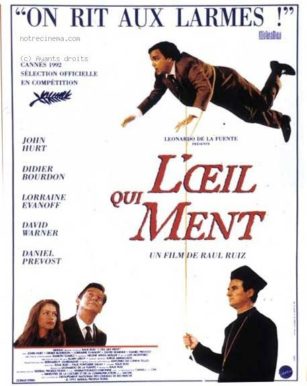 Some serious weirdness from the late Raul Ruiz, who delivered a wildly inventive satire about the walking dead, soul transference, prosthetic limbs, miracles and magic paintings.
Some serious weirdness from the late Raul Ruiz, who delivered a wildly inventive satire about the walking dead, soul transference, prosthetic limbs, miracles and magic paintings.
Believe it or not, this beyond bizarre French-Portuguese co-production was intended as a (somewhat) commercial offering by the inimitable Ruiz, having been largely shot in English with a respectable budget and John Hurt and David Warner in pivotal roles. Ruiz claims he intended the film as a Monty Python-esque comedy, but that’s not quite what made it to the screen.
Distribution-wise DARK OF NOON (L’OEIL QUI MENT; 1992) was briefly released theatrically in several countries in 1993, only to wind up all-but buried—a fact that never seemed to concern the famously mercurial Ruiz much at all.
Felicien, a young doctor, is dispatched to the Portuguese “Village of the Dogs,” marked by fields of crutches, walking corpses and the Virgin Mary, who floats above the ground and periodically sets fires (lending her the nickname “Our Lady of Fire”). The true object of Felicien’s quest is an opulent mansion run by Anthony, an English entrepreneur who manages a factory that manufactures prosthetic limbs—and who owes Felicien quite a bit of money. Among the denizens of the mansion are Anthony’s alluring wife Ines, the artist-butler Ellic and the Marquis, the mansion’s owner and Ines’ father, who also happens to be Anthony’s double.
Exploring the town, Felicien finds a boy who performs miracles and a priest buried alive by Ellic. The latter uses corpses as “material” for his paintings, which have unique magical properties. Felicien also discovers a cobwebby laboratory in the mansion where inhumane experiments are performed, and is nearly crushed by a giant plaster finger that crashes though the guest room ceiling.
Flashbacks fill us in on the particulars of Anthony’s history in the Marquis’ mansion. Among other things, we learn how Anthony and Ines’ souls left their bodies one night, and how doubles of the two were created in the aforementioned laboratory. The doubles, it seems, are now ensconced in the mansion, while the souls of Ines and Anthony both occupy the Marquis’ body.
Back in the present Felicien is literally thrown out of the laboratory after asking too many questions, and is stuck hovering in midair by the miracle-working boy, who refuses to let him down—the boy can’t perform miracles without permission, after all. Eventually the boy receives the desired permission and lets Felicien down, by which point an evil force is discerned heading toward the town. Can Felicien save the town—or better yet, escape in time?
DARK AT NOON is more subdued and traditional in form than more outré Raul Ruiz productions like CITY OF PIRATES and THE BLIND OWL. It has a refined and handsome look redolent of a MASTERPIECE THEATER episode, with tightly controlled, unshowy camerawork (occasional vertically angled set-ups aside). Such an approach only accentuates the weirdness and absurdity of the film, which in true surreal fashion presents its various oddities in an unerringly matter-of-fact manner.It’s all extremely imaginative, but also wildly undisciplined. There’s a faintly parodic tone that makes it difficult if not impossible to take the proceedings seriously, although it’s clear from the start that Ruiz doesn’t intend for us to do so–as one character replies when asked if he dreams, “This is a dream!”
In keeping with Ruiz’s usual preoccupations, the film is packed with literary allusions and intellectual game play. The narrative may be silly to the point of distraction, and packed with weirdness-for-weirdness’ sake, but there’s an undeniable intelligence to it. Precisely what that intelligence is trying to convey is anyone’s guess, but DARK AT NOON is still an enjoyable run-through of the quirks and obsessions of one of filmdom’s most joyously eccentric artists.
Vital Statistics
DARK AT NOON (L’OEIL QUI MENT)
Animatografo/Canal+
Director: Raul Ruiz
Producer: Leonardo De La Puente
Screenplay: Raul Ruiz, Paul Fontaine-Salas
Cinematography: Ramon Suarez
Editing: Helen Weiss-Muller
Cast: John Hurt, Didier Bourdon, Lorraine Evanoff, David Warner, Daniel Prevost, Myriem Roussel, Filipe Dias, Rosa Castro Andre, Maria Joao Reis, Adriana Novias, Batista Fernandes
